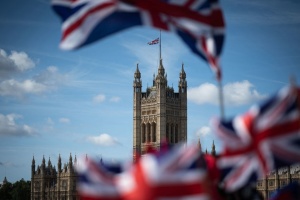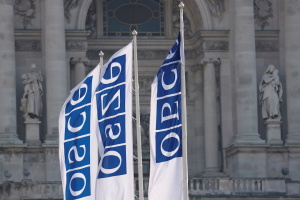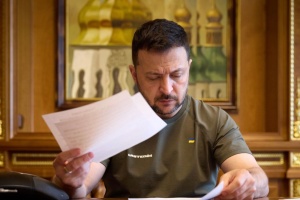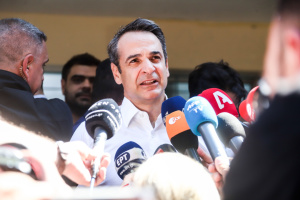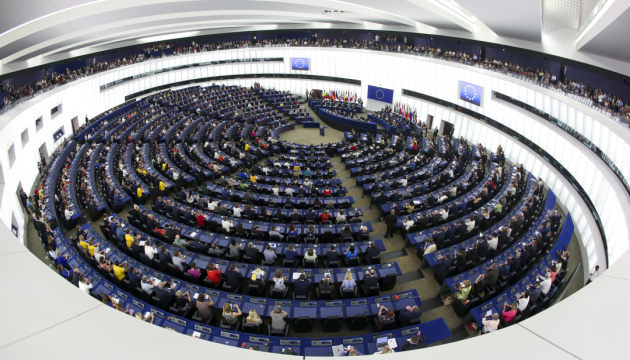
Right-Wing Candidates are set to Make Significant Gains in Upcoming EU Elections in France:
The countdown has begun. In less than a month, from June 6 to 9, elections to the European Parliament will be held in all EU countries. France will vote on June 9. The country will fill a record number of seats in the next EU parliament: 81 out of a total of 720, twice the number of seats it holds currently, and never before these elections have weighed so much in the political life in the European Union in general and in France in particlar.
There are several reasons for this. The first is common for many other European countries, where right-wing populists are gaining momentum, and France is no exception.
The second is that Europe is not at all as united as claimed in statements by many of its leaders regarding support for Ukraine, for example. The third reason is that the European elections in France are viewed as a mid-term clash between French rivals ahead of the next national elections in 2027, notably between President Emmanuel Macron's centrists and his challengers on the hard right.
The previous elections to the European Parliament in France, whereas they gave a boost to the internal political life, in no way affected life of ordinary French people. First, because this is the only proportional elections in France. Second, their results didn’t get much notice at the national level, but more at the international level, somewhere far from Paris, in the capitals of the European Union - Brussels and Strasbourg.
But things are different this time around. As many as two European "taboos" have been breached simultaneously in recent years. First, the Europeans, after Brexit, suddenly realized that the EU is not a fortress, and a member can easily leave the Union should it believe the alliance no longer meets its interests. Now the issue of a potential exit from the European Union has become a “hobby horse” for the far-right parties and politiciants in many countries. Secondly, the idea that peace in Europe is a constant, that it can no longer be taken for granted has crumbled to pieces and turned out to be illusory. The understanding of the fact that there is a war of such unprecedented proportions being waged on the continent, and that Europe alone cannot carry the weight of this war on its shoulders, cannot but worry.
So, these elections mean a lot, and not only for the French people, but also for us, Ukrainians. Who they vote for will depend to a degree upon how persistent the European Parliament will be in supporting us. Now let’s take a look at the election favorites and the policies they are campaigning for, particularly with respect to Ukraine.
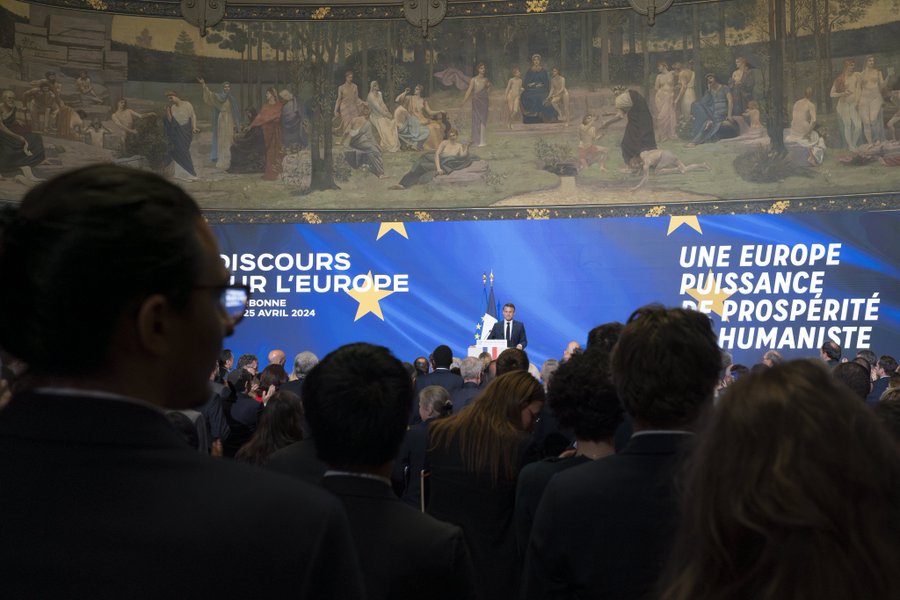
"A EUROPE THAT CAN DIE"
The President of the French Republic, Emmanuel Macron was the one who set the keynote of this election campaign. He made, in his trademark style, an outrageous claim about the death of Europe. "Europe is mortal, it can die!" Macron warned during his speech on the future of Europe at the Sorbonne in Paris on April 25, 2024, and proposed his recipe for European recovery and new prosperity.
Macron's project focuses on a geostrategic Europe that is in control of its borders, is able to defend itself and to become an international actor capable of competing with the world’s two superpowers, the United States and China. Macron's strategic goal is to make Europe a really strong power not only in military terms, but also in the areas of scientific research and trade.
In his speech Macron also mentioned the challenges facing the EU in tightening control over immigration among other urgent necessities.
The speech about the future of Europe lasted almost two hours and smoothly went into the program statement of the election alliance led by Macron's party. It was so obvious that the French national broadcasting regulator required that the time of Macron's speech be deducted from the time quota allocated to the presidential political force for election campaigning. After all, this was the essence and content of the speech: Macron, as a European leader, not only saves the continent, but also seeks to promote his own alliance in the European elections. Because things are bad with his party’s alliance, almost like he depicted the future of Europe in his speech.
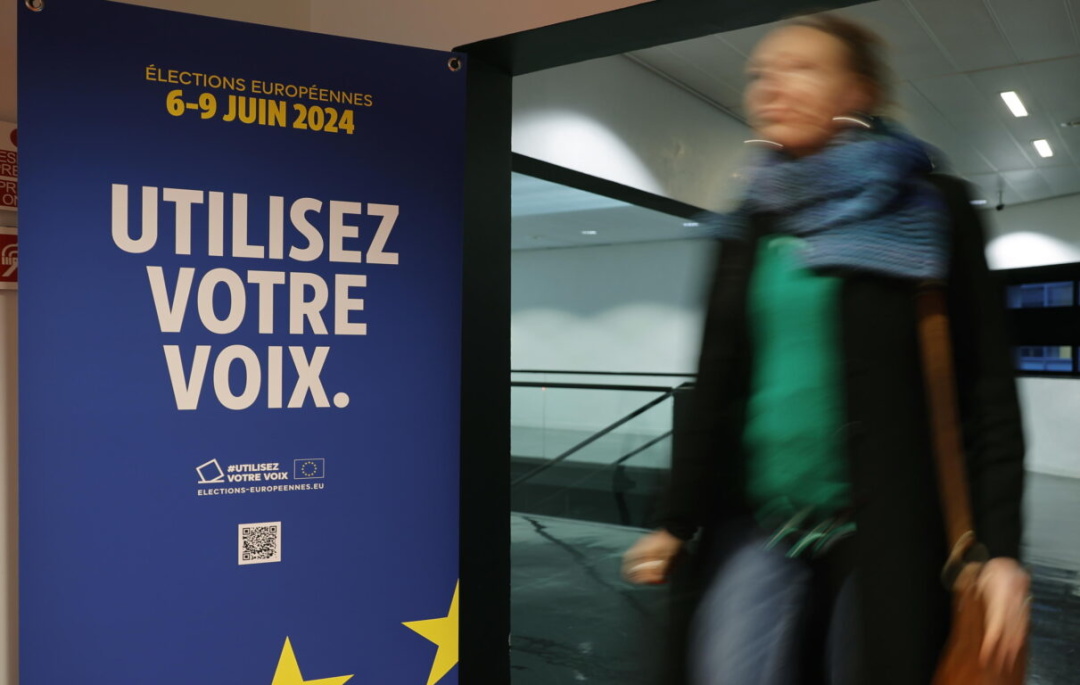
DID THIS BLEAK PICTURE SCARE THE FRENCH?
Do French voters share such a pessimistic vision of the future of Europe as depicted by President Macron? Maybe yes. But a future of Europe is definitely not what concerns them most.
An Ipsos survey conducted in early May in partnership with Le Monde found that the French voter expectations are quite different.
Asked about the challenges they think the EU should address as priority, the French put the migration crisis first (42%), climate change second (36%), and the future of agriculture third (35%). A joint EU defense is a concern for 28% of respondents, and 24% of those questioned spoke in favor of a stronger EU's position vis-à-vis China and the USA.
Regarding support for Ukraine, only 13 percent of respondents mentioned it among their worries (that being said, it is worth noting that a majority of French voters are still in favor of providing assistance to Ukraine). It therefore comes out that the challenges identified by Macron in his most recent Sorbonne speech as being of key priority are not the top priorities for French voters.
However, such emphasis on the "fear" of leaving Europe and on the return of war to the continent is not least related to the need of mobilizing the French electorate to turn out and vote.
WHAT TURNOUT TO EXPECT
French voters are divided over whether to turn out, or not to turn out at the upcoming EU elections. Some 49% of citizens said they were interested in the European elections (according to a poll conducted by ViaVoice for Radio France, France Télévisions and France Médias Monde on May 6), and 48% said they were not interested.
In this matter, voters are divided along age lines. Among those who are least interested, middle-aged people (35-49 years old) make up 38%. Among those who want and will turn out for vote, 60 percent of the voters aged 65+ said they would do so.
Now let's see who they can and want to vote for. Party lists for the elections have been presented to the public, with all the names and faces. So, here are their leaders rated according to the latest surveys and forecasts.
JORDAN BARDELLA, MARINE LE PEN’S FAR-RIGHT "NATIONAL RALLY" PARTY
28-year-old Jordan Bardella, the president of Marine Le Pen's National Rally (Rassemblement National/RN) party, is far ahead in opinion polls, with over 30 percent of voter intentions, according to most recent surveys. It was Le Pen who put the former spokesperson for her party and the leader of her youth movement on top of the party list for the previous European elections 2019. The risk paid off, as RN came in first, albeit at a narrow margin of just less than one percent over President Macron’s ruling coalition (Renaissance, MoDem, Horizons and UDI ). Jordan Bardella has since replaced Marine Le Pen as the party leader, but they are working in tandem.
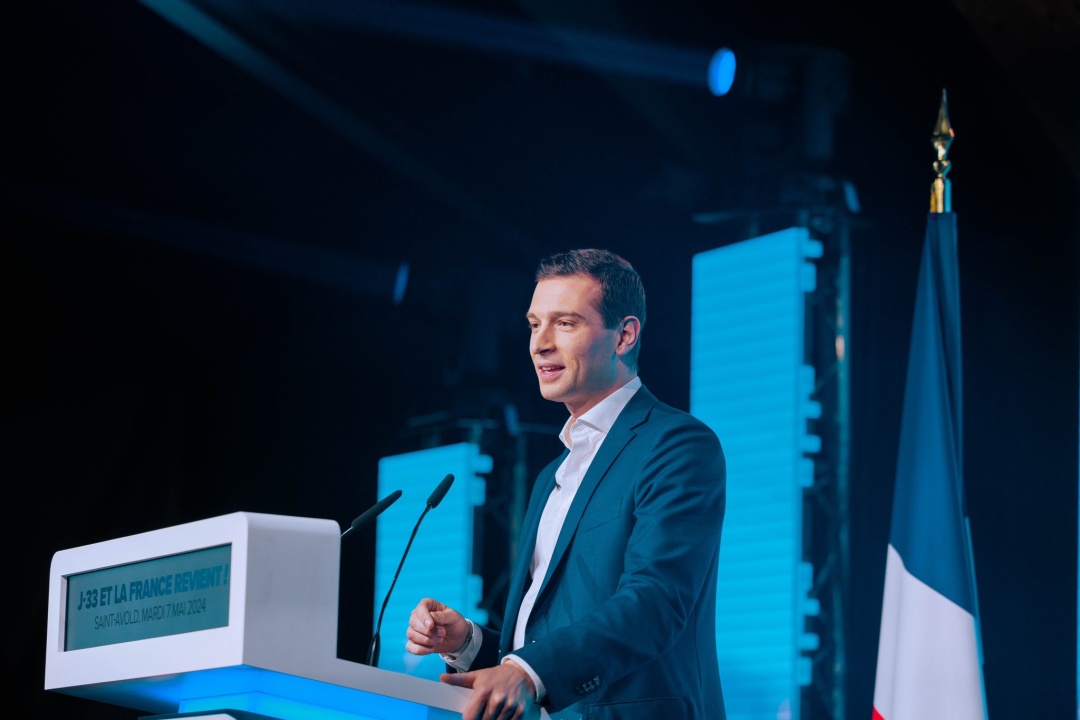
The young politician has become a star of social networks, and there has been set up a specialized team for his promotion. Bardella's TikTok account alone has 1.2 million followers. When he convenes a party for his supporters through the Internet, a quarter of Paris is paralyzed by lines of young people waiting for entrance to the gathering site.
The ultra-right movement in France is now driven mostly by rising engagement of younger generations, and Bardella is he who personalizes them. Being most popular among the young people, but also among older, more experienced voters, he is sometimes called an "evader". Bardella tends to avoid explicit answers to uncomfortable questions. Yes, after Macron's Sorbonne speech, Bardella held his own press conference where he read out kind of a reply to the president’s message, but refused to answer difficult questions in order not to take unnecessary risks. However, Jordan does not always shy away from discussions, but more on that later.
VALERIE HAYER, top candidate for Macron’s coalition (Renaissance, Horizons, MoDem)
Valerie Hayer, 38, was leading the centrist Renew Europe group in the European Parliament after its previous head, Stéphane Sejourne, left to join Attal's government. An expert in budgetary issues and a Sorbonne graduate, Mrs. Hayer started her career in politics as a municipal councillor for the western French village of Saint-Denis-d'Anjou.
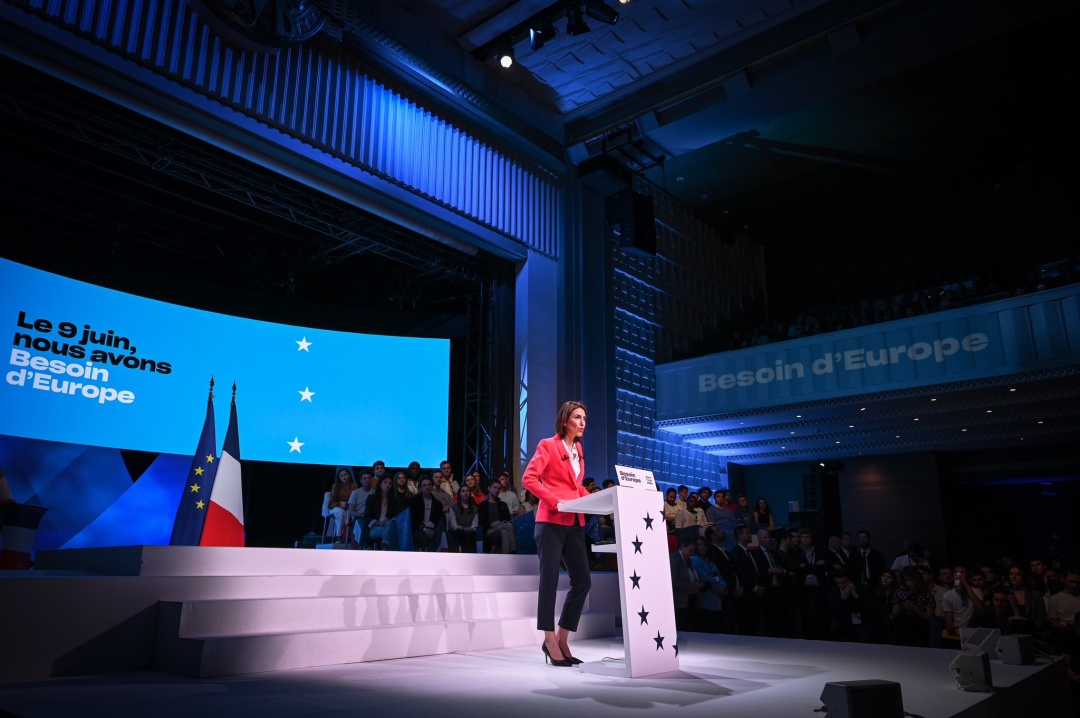
Hayer portrays herself "a farmer's daughter, a farmer's granddaughter, and a farmer's sister." Actually, it is perhaps this farmer’s background that has brought her to the top of the list for these elections, which was being compiled just at the height of the farmers’ protests in France. Valerie Hayer joined Macron's party in 2017, but has never been there in a leading role. As of this day, Hayer with 16-17 percent of voter support is lagging far behind Bardella’s party (31.5 %).
RAFAËL GLUCKSMANN, SOCIALIST LIST LEADER
44-year-old Raphaël Glucksmann is breathing in Valerie Hayer’s back; according to the latest polls, they are separated by a margin of just a few percent of voter intentions. Surveys put Glucksmann on 14 percent, and his ambitious goal is to win over the president’s coalition.
Elected as an MEP in 2019, Glucksmann sets himself up as the biggest "Europhile". "Europe is the struggle of my life," he likes to repeat. His campaign is focused on the need for a strong European Union facing a competition from foreign powers, including Putin's Russia.
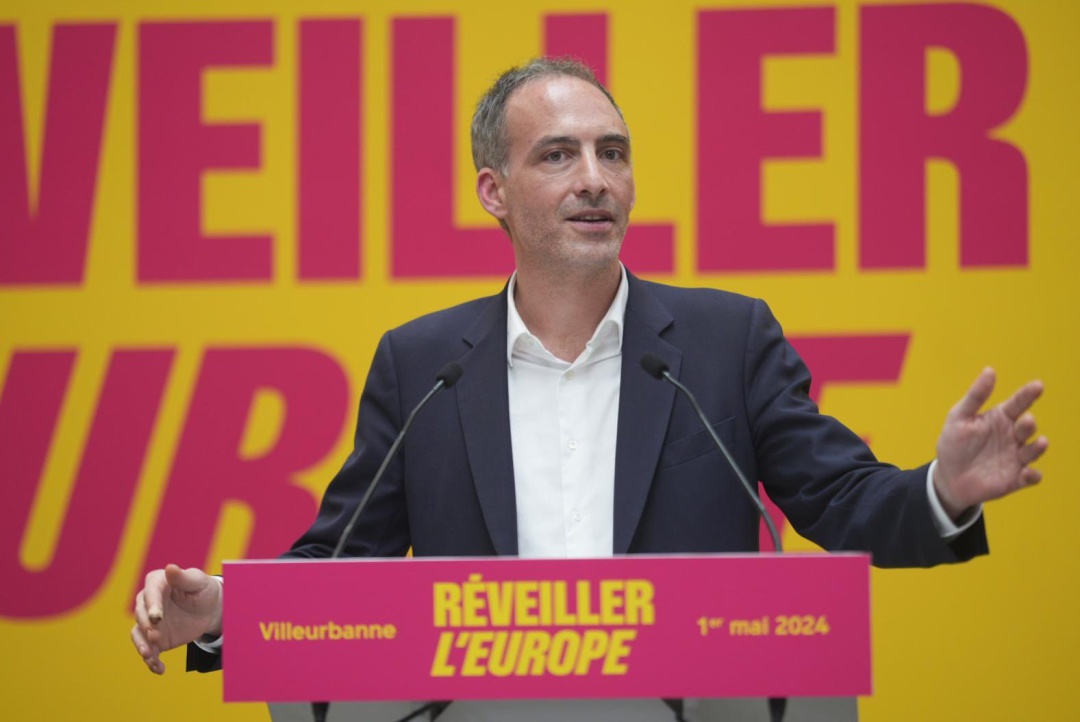
In every public speech, Glucksmann insists that the French government must provide Ukraine with more and stronger support than it does now. He is pushing for Ukraine’s EU integration in the medium term; this is what distinguishes him from the rest of the left-wing, who are not that favorable towards such a possibility.
MANON AUBRY, ULTRA-FAR-LEFT PARTY "LA FRANCE INSOUMISE" (UNCONQUERED FRANCE/LFI)
Manon Aubry, 34, was promoted to top candidate for LFI for the European elections 2019. With 6.3 % of the vote, Jean-Luc Mélenchon's party won six seats in the European Parliament where she co-chaired the group of left-wing parties. She is campaigning for the European Union to continue with financial, logistical, humanitarian, and military support to Ukraine. "But at the very moment you provide not just defensive weapons, but offensive weapons too, you become a belligerent party to the conflict," Aubry insists. She believes it impossible for Ukraine to join the EU.
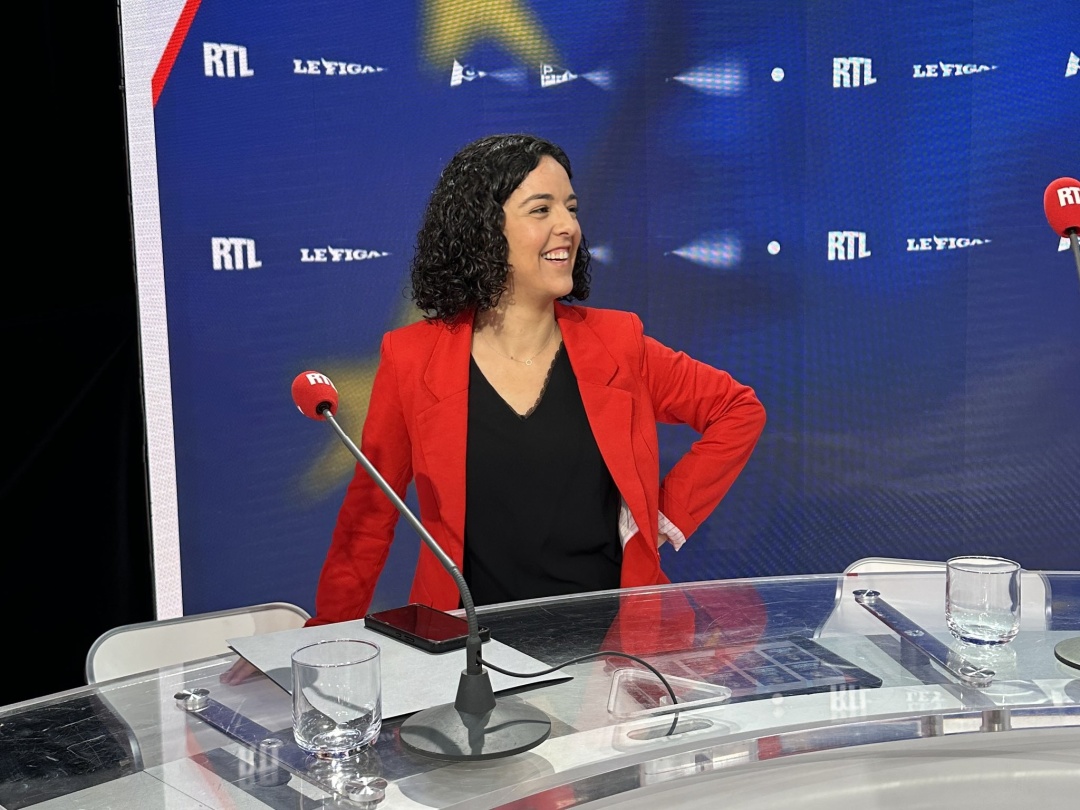
Her party managed to come in the fourth place in the race with eight percent of voter support. This is, according to polls, due to Palestinian activist Rima Hassan who and Manon Aubry have been on TV screens since the start of pro-Palestinian rallies in France.
FRANÇOIS-XAVIER BELLAMY, LES RÉPUBLICAINS
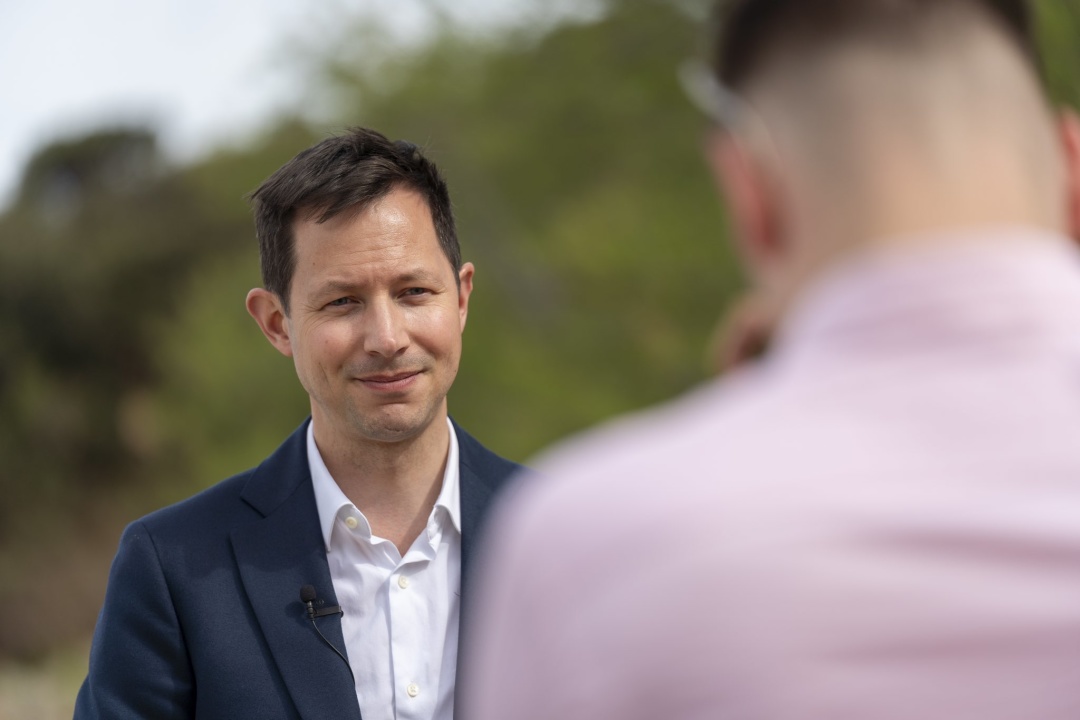
Bellamy, a philosophy teacher, joined Les Républicans in 2019, and led the party's European elections campaign. LR obtained 8.48 % of the vote, resulting in 8 seats in the European Parliament. Conservative Republicans now have a +/- 8 percent rating, as do left-wing radicals. Regarding the Ukrainian issue, Bellamy said the following during the last debate: "We obviously have to support, but with weapons and ammunition." The war in Ukraine "must end when the Ukrainians decide to negotiate peace on their terms,", "and it's not for us to decide", says Bellamy. "Our role is to support Ukraine so that it is in the strongest position possible," the Republican list leader said.
MARIE TOUSSAIN, ENVIRONMENTALISTS
Marie Toussaint, member of the European Parliament of the previous convocation, rose to prominence on the activist scene with "The case of the century," by suing the French state and get it to respect its climate commitments. More than 2 million citizens signed the petition that was launched concurrently, and in 2021, France was condemned by a top administrative court for climate inaction. French environmentalists are our old "allies". They are pushing for the confiscation of 200 billion euros worth of frozen Russian assets, and for the creation of funds of all kinds to support Ukraine. It is their conviction that under no circumstances should Ukraine be given away to Putin, because Ukraine, as the French Environmentalists put it, is a granary, and it has "strategic metals for the transition period".
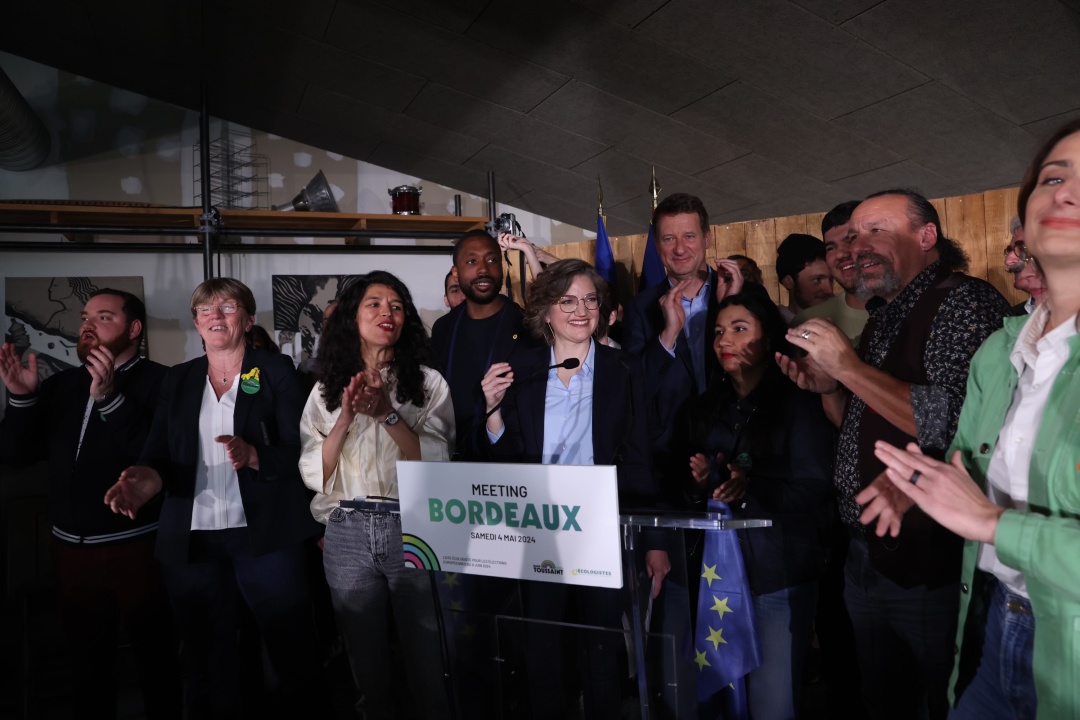
Toussain, with a stable 6.5 percent of voter intentions, confidently makes it through to the European parliament, with a minimum threshold of three percent required to win a seat.
MARION MARÉCHAL, FAR-RIGHT CONSERVATIVE PARTY "RECONQUÊTE!"
Granddaughter of Jean-Marie Le Pen and niece of Marine Le Pen, Marion Maréchal and her Reconquête! Party score equally with the environmentalists one month before the elections. In 2017, Maréchal withdrew from political life and distanced herself from the party. For the 2022 presidential election, she supported far-right polemicist Eric Zemmour and became executive vice-president of his Reconquête ! party. An unsuccessful MP candidate in the 2022 legislative elections, she was chosen in September 2023 by Zemmour to lead Reconquête ! for the European elections-24.
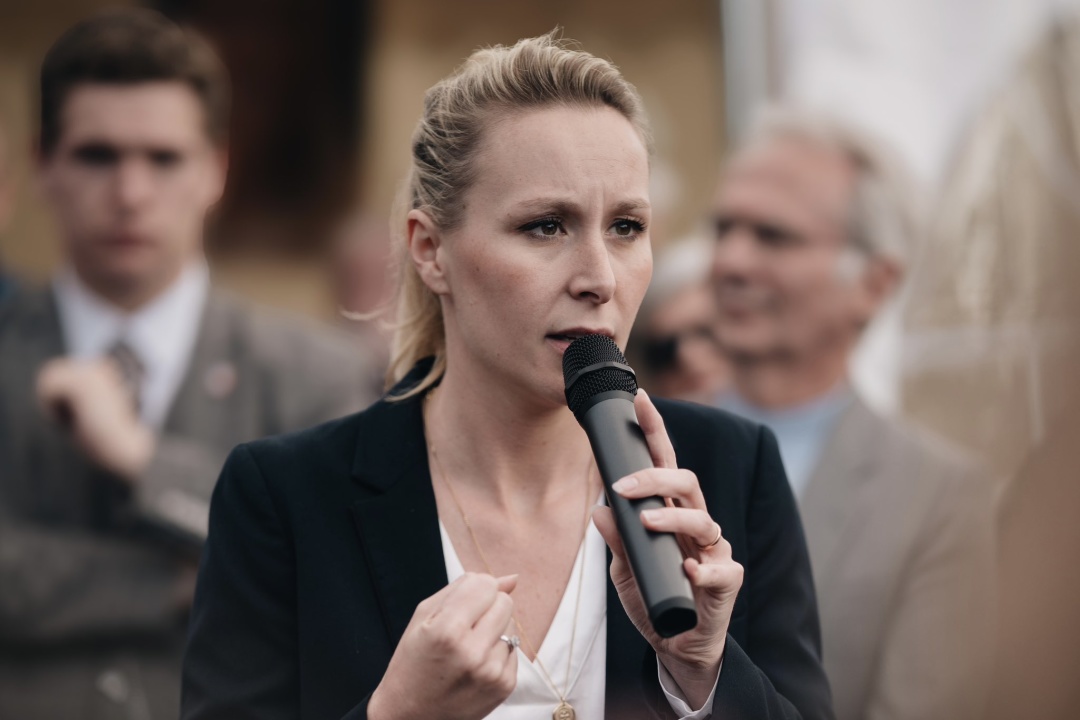
Marion Maréchal has recently spoken much in support of Ukraine, which is strange to hear from a leader who has always actively supported Russia and traveled to the annexed Crimea. The devil, as always, is in the details. "We can wish Ukraine to win, but at the same time are not willing to wage a war on its behalf," she says. The red lines, according to Maréchal, are [French] troops in Ukraine, Ukraine's EU membership and integration into NATO. She claims Ukraine’s potential EU integration will kill the agriculture in France.
WHAT MACRON OFFERS TO SAVE EUROPE (AND HIS PARTY)
On May 6, Macron’s coalition introduced its election program bearing the slogan "On June 9, we need Europe," which is in line with the speech President Macron delivered at the Sorbonne.
A key provision contained in the program is to establish a fund to support the European defense industry amid Russia's ongoing invasion of Ukraine. The goal is to raise 100 billion euros, through a loan from the European Investment Bank. The "European preference" should legislate that weapons contracts should be placed with continental manufacturers.
The program, incidentally, contains no mention of the expansion of Europe. "We, unlike some others, are not hostile to expansion in principle, but there are stages, conditions, terms; we are not talking about expansion tomorrow morning," commented one of the authors of the program, Clément Beaune.
HOW THE LEADING PARTY VIEWS UKRAINE
There is no principal difference between election policies pursued by Marine Le Pen and Jordan Bardella. With the beginning of the war, the two, of course, condemned Russia’s aggression, but... When it comes to helping Ukraine, they are reluctant to talk about offensive weapons. When it comes to anti-Russian sanctions, they oppose to restrictions on the aggressor’s energy sector. Add to that, they do not rule out the recognition of Crimea as part of the Russian Federation.
But the two leaders’ statements often have differing rhetoric. The young politician, for example, might say that "Russia has been escalating for two years," while veteran Le Pen uses the term "escalation" only while speaking about Macron, calling him a "warmonger" and an "hurdle on the path to peace."
The Le Pen’s party abstained from a symbolic vote in parliament regarding France's strategy vis-a-vis Ukraine. The National Rally is claiming that the proposed strategy crosses "red lines", in particular, as regards the support for Ukraine's membership in the European Union and NATO.
Everyone remembers the ambiguous relationship between Le Pen and Vladimir Putin, and the scandal involving the financing of her party with Russian money.
WHAT BARDELLA-HAYER DEBATE REVEALED
The first debate between the candidate of the presidential majority, Valerie Hayer, and the lead candidate of the National Rally, Jordan Bardella, held live on BFM TV on May 2, was particularly harsh. The challenge for Valérie Hayer was to make herself known in the media and to convince voters of the presidential majority. For Jordan Bardella, the aim was to consolidate his position: polling at 30% of voting intentions in recent surveys, compared to 17% for Valérie Hayer.
In their first face-to-face debate, Jordan Bardella and Valérie Hayer presented two diametrically opposed visions, be it agriculture, Ukraine or immigration. Valérie Hayer denounced what she considers the deceit of the National Rally’s European program: Jordan Bardella’s flaw being “duplicity” (“he says what he doesn’t vote for, he votes for what he doesn’t say”) and his quality, “the audacity to pronounce so many lies with such composure.” Bardella, on his part, praised the “courage” of his opponent who represents Emmanuel Macron’s record and has agreed to run as a candidate.
Bardella, like Le Pen, always resorts to this technique – he criticizes the current president when asked annoying questions. Actually, both Macron and Hayer respond in kind to the National Rally. Although during the debate Mrs Hayer mentioned Bardella's low activity in the European Parliament, his support for Brexit, and many other "uncertainties", even not voting for the resolutions on Navalny, it did not help at all and Hayer failed to defeat his opponent.
ANTI-FAR-RIGHT STRATEGY ISN’T WORKING
The gap in voter intentions between the majority and the far-right has never been so great. Let's recall: about 16 percent for the Macronists and more than 30 percent for RN. So the outcome of the 2019 European elections, where the presidential coalition finished only one point behind the far-right winners (23 to 22), seems unattainable in 2024.
"The only “hook” they found is Ukraine and Russia, which allows them to attack RN from the side of patriotism and sovereignty," says Philippe Moreau-Chevrolet, a prominent French political commentator. However, strategies of sharp verbal attacks on Le Pen’s camp no longer add to the percentage of voter intentions, he argues.
At a debate in parliament, Prime Minister Gabriel Attal explicitly called RN the “Kremlin’s servants” and "disguised Brexiteers" who hold the European Union "hostage to the discourse of lies".
As a senior member of the majority party said in an interview with France Télévisions, "to confront Bardella, we must continue to expose his hypocrisy and contradictions. But this does not seem to be of interest anymore."
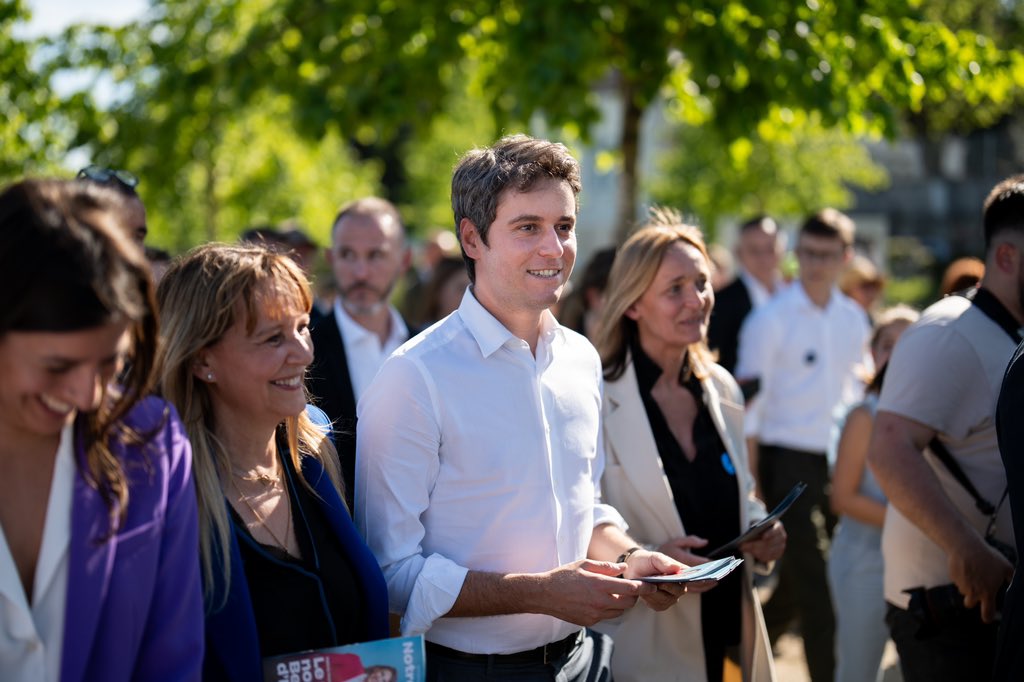
GABRIEL ATTAL ENTERS THE BATTLE
Gabriel Attal, a young and popular politician serving as the Prime Minister of France since January 2024, seems to remain the last “magic wand” for Macron. Earlier, Gabriel Attal, whose mastery of public debate could only be rivaled by Macron himself, insisted on a verbal duel with Marine Le Pen, but, under pressure from Macron, he had to agree on a debate with Bardella. So, on May 23, the whole of France will be watching the duel between Attal and Bardella.
What other "administrative resource" could Macron use except his own name?
In addition to delegating his prime minister to a verbal duel, Macron is going to the polls virtually in person. That is why Emmanuelle Marcon and Valerie Hayer are shown together on campaign posters. So that no one confuses anything. On June 9, we all will see how helpful Macron's portrait and the support of his Cabinet will be for the presidential coalition.
Lidia Taran, France

